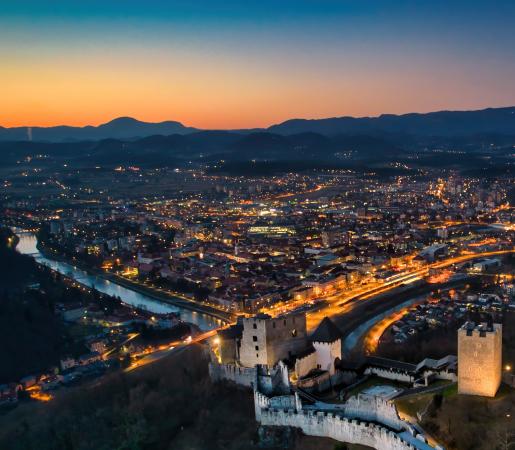
Celje
MAG-NET - MAGnetic attraction forces of the city NETwork
About the project
The MAGnetic Attraction Forces of the City Network, MAG-NET, tackles the urgent issue of talent drain in Celje and neighbouring Prebold, Slovenia. These cities are losing young talent to larger urban centres that provide better education and job opportunities. This has led to an aging population and declining urban vitality.
MAG-NET’s goal is to transform Celje and Prebold into vibrant, talent-driven communities. The project is set to create an urban innovation network with a central hub in Celje and a mini-hub in Prebold. These hubs support the development of new solutions to key urban challenges.
The project pilots five Urban Real-Life Learning Labs (RLLLs), known as MAG-NETic Fields. These “fields” focus on affordable housing, sustainable mobility, community energy, urban vibe and Industry 4.0. By engaging youth, businesses and citizens, MAG-NET is designed to co-create innovative solutions that integrate into city practices.
Expected outcomes include the creation of new enterprises, the development of urban solutions, and a sustainable framework for urban authorities. This framework will foster innovation, attract talent, and support inclusive local development, providing a model for other European cities.
Challenges
The cities of Celje and Prebold face the growing challenge of talents migrating to larger urban centres in search of better education, employment and quality of life. This has led to aging populations and weakened urban vitality. Key issues include the need for affordable housing, sustainable mobility, and a vibrant urban atmosphere to attract and retain talent. MAG-NET addresses these challenges to create resilient and thriving communities.
-
Celje, Slovenia’s fifth largest city, faces job losses due to the decline of old industries. It lacks a university, worsening the talent drain. Prebold, closely linked to Celje, is becoming a commuter town, amplifying these issues.
-
The region has higher poverty rates and lower quality of life than the nearby capital Ljubljana. To compete, Celje and Prebold need to provide better housing, enhance urban vibe, reduce car dependency and improve employment options.
-
Fragmentation among public administration, civil society and industry is slowing urban development. Limited NGO presence and low civic engagement prevent residents from actively participating in urban planning and decision-making.
Proposed solutions
MAG-NET’s model includes three key components: a dedicated space with a digital platform, challenge-based projects, and innovation teams. This approach fosters alliances among urban authorities, enterprises, research institutions and citizens, creating environments for innovation. Through these initiatives, MAG-NET can develop new services, digital tools, and collaborative projects that integrate into the cities' practices, driving sustainable growth and inclusive development.
-
MAG-NETic Fields: Piloting 5 scalable urban sandboxes (urban RLLL) to address critical areas for talent attraction and retention, e.g. affordable housing, sustainable mobility, Industry 4.0, urban vibe and community energy, to enhance city attractiveness.
-
MAG-NETic Particles: Diverse teams of youth, industry experts, governance, civil society and researchers address challenges through identification, research, co-creation and testing, designing solutions and integrating them into the city’s practices.
-
MAG-NET Hub: Creating a cross-sectoral, interdisciplinary, inter-generational innovation and responsible entrepreneurship support space for cities: a main Hub in Celje (MUA) and a Mini-Hub in Prebold (AUA), enhanced by a digital MAG-NETic Platform.
-
MAG-NETic Solutions: Final outputs of the urban RLLL process, including prototypes, new services, digital apps, start-ups, industrial projects, policy recommendations and civil initiatives, all integrating innovative approaches into city practices.
-
MAG-NETic Toolkit: A comprehensive set of tools and guidelines to ensure the sustainability, scaling and transferability of the MAG-NET model. This will enable other cities to replicate and adapt the project’s innovative solutions and practices.
Milestones
Start of pilot projects addressing five urban challenges
Completion of field research activities to gather insights into addressing urban challenges
Completion of the MAG-NET Hub concepts and blueprints, co-created with stakeholders
Official opening of the MAG-NET Hub, including the launch of its services